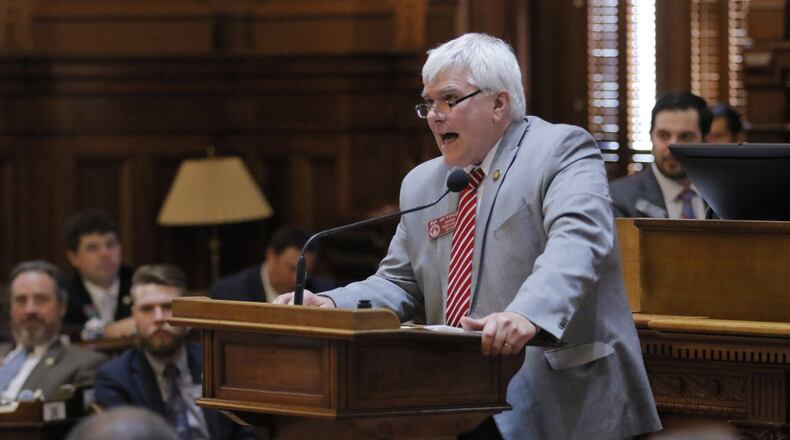After defeating it once, the House approved legislation late Friday to tax Uber and Lyft riders.
House Bill 225, sponsored by House Ways & Means Chairman Jay Powell, R-Camilla, clarified that under state law, the services would have to collect and remit sales taxes. The measure was approved after being voted down earlier in the day.
Uber officials, who have been fighting the bill, said the combined tax in Atlanta would be near 9 percent and average 7 percent across the rest of the state. Powell said taxi and limo companies have long had to charge sales taxes.
State Rep. Alan Powell, R-Hartwell, said Uber and Lyft should already be charging taxes for rides.
“To each and every one of you who pay your taxes, to every citizen in this state who pays their taxes, they should be offended,” Alan Powell said. “They should be irate that we have large national companies, no matter how good their business model might be, that are taking advantage of taxpayers in this state.”
Uber spokeswoman Evangeline George said if approved by the Senate, the measure would force “seniors to pay more for rides to their doctors, students to pay more for safe rides home late at night, and commuters to pay more for rides to work.”
“This tax is wildly out of step with how ride sharing is governed across the United States,” she said “As this legislation moves to the Senate, we urge senators to protect the hard-earned money of their constituents and work to create a solution that makes sense for Georgians.”
Also late Friday, the House passed a bill 166-3 that Georgia’s used-car dealers said would jack up title taxes on the cars they sell.
Supporters of House Bill 340 say it would merely force used-car buyers to pay the tax under the same system that governs new-car buyers.
The battle between car dealers is over a provision that essentially would charge the 7 percent tax on the sale of a used car based on the sales price or the state’s book value of the motor vehicle, whichever is higher.
Generally, the sales price is higher.
Currently, according to backers of the bill, new cars are taxed based on that formula, whereas used cars are taxed at the typically lower book value.
Lobbyists for the used-car industry say the change amounts to a tax increase for car buyers and could hurt the industry. New-car dealers have backed the bill.
Even opponents of the measure say some dealers have “gamed the system” by artificially inflating the value of trade-ins but then having the car that’s purchased taxed at the book value.
The bill's sponsor, state Rep. Shaw Blackmon, R-Bonaire, said the measure would also make changes to taxes on leased vehicles and cap how much people moving from others states would have to pay when they register their cars in Georgia.
In addition to those bills, the House advanced two tax breaks for the music industry.
House Bill 155, sponsored by state Rep. Amy Carter, R-Valdosta, would make music production companies eligible for a 15 percent tax credit in hopes of keeping talent in Georgia.
House Bill 196, sponsored by state Rep. Matt Dollar, R-Marietta, would provide an exemption for royalties paid to musicians.
All the tax bills now head to the Senate for its consideration.
Legislative session coverage
The Atlanta Journal-Constitution has the largest team covering the Georgia Legislature. To see more of its legislative coverage, go to http://www.myajc.com/georgia-legislature/. To track particular bills and resolutions, check out the Georgia Legislative Navigator at http://legislativenavigator.myajc.com/. You can also follow the proceedings on Twitter at http://twitter.com/GAPoliticsNews or on Facebook at http://facebook.com/gapoliticsnewsnow.
Subscribe to our newsletter for more news about Georgia politics. Subscribe to politics news alerts in the AJC news app.
Keep Reading
The Latest
Featured





